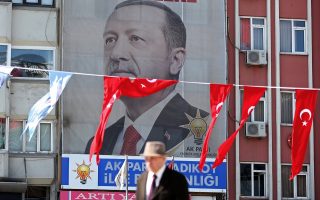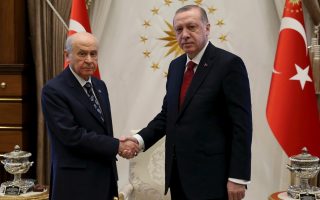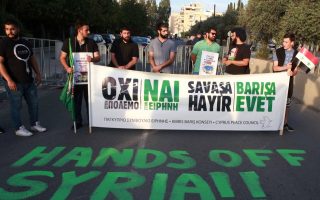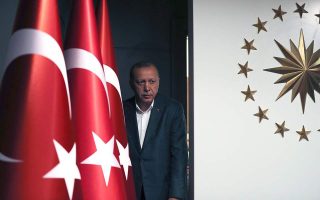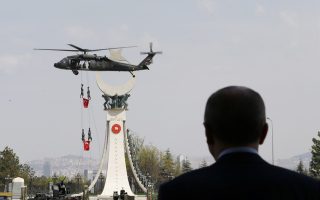Erdogan’s Trojan Horse in FYROM
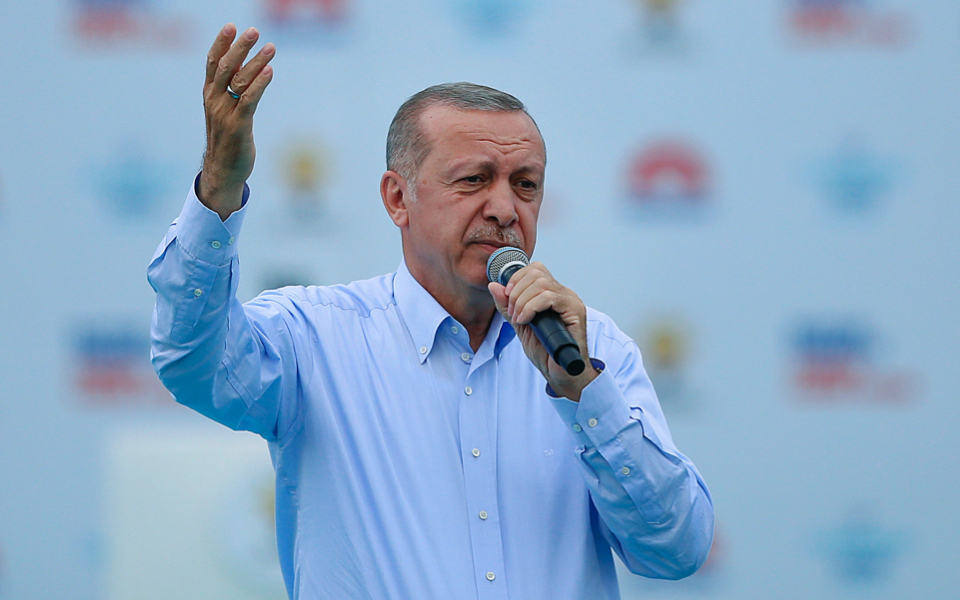
Turkey’s president, Recep Tayyip Erdogan makes no secret of his ambition to spread his neo-Ottoman wings all over the Balkans. He views the Former Yugoslav Republic of Macedonia (FYROM) as another Turkish satellite in the making, which sadly the government in Skopje seems to have embraced without carefully assessing the long-term adverse ramifications. Very few Albanian voices in FYROM have the courage to publicly criticize Erdogan, fearful of becoming a target of threats and insults by a huge propaganda machine directed by many of his cronies. Erdogan has been extremely successful in influencing the majority of Albanians in the country, many of whom consider him as their one and only trusted leader.
For more than a decade, Erdogan has invested heavily in spreading his influence among Albanians, through building mosques and Turkish schools, and funding media, religious institutions, and most recently political parties, which are directly controlled by his close associates and have dramatically increased his influence over the Albanian community.
Anyone who dares to criticize Erdogan or discuss his personal ambitions in FYROM is attacked publicly by the “internet brigade” as an Islamophobe or traitor.
“I was personally a target of these attacks twice,” says Xhelal Neziri, an experienced investigative reporter from FYROM. “They cannot stop me from telling the truth, but it is a fact that many of my colleagues do not want to talk about this topic, because of the ‘lynching threats.’”
A majority of Albanians in FYROM identify themselves as Muslims rather than by their Albanian national identity. There are voices within these fanatical religious groups saying that Albanians should not recognize Mother Theresa as a saint, even though she was an Albanian from FYROM, because she does not represent the interests of the Muslim community. The number of those who believe that other national Albanian heroes like Gjergj Kastrioti “Skenderbeg,” who led a rebellion against the Ottoman Empire in the 1400s, should not be recognized because they were Christians, is increasing rapidly.
Compared to Albanians in other Balkan states who don’t consider religion to be a dominant factor in their lives, those in FYROM are the staunchest supporters of Erdogan and his Islamic agenda. Erdogan’s strategy for restoring Turkey’s influence in the Balkans, akin to what the Ottoman Empire once enjoyed, had early success with the Albanians in FYROM.
Nearly two-thirds of the population in FYROM are ethnically Orthodox Christians, and the other third of the population are predominantly Albanian Muslims. In 2001, tensions between the two groups escalated into an armed conflict between government security forces and the Albanian National Liberation Army (NLA).
The conflict was short-lived and ended with the Ohrid Agreement – a peace treaty that saw NLA commanders rebranded as legitimate politicians, gaining enhanced social and political rights which were granted to FYROM’s Albanian citizens. While armed hostilities ended nearly 17 years ago, relations between the different groups are still raw.
Albanians are disadvantaged and neglected, and continue to suffer from inequality. FYROM has denied their basic human rights. The Albanian language was not recognized until March 2018, when FYROM’s parliament passed a law extending the official use of the Albanian language, despite massive protests from the right-wing opposition.
The country’s Slavs and Albanians still live largely separate and do not enjoy equal rights. Erdogan has used ethnic and political problems between Slavs and Albanians as a “golden opportunity” to portray himself as the greatest defender of the latter.
According to the World Bank, in 2016 Turkey’s exports to FYROM totaled $378 million and imports amounted to $82.6 million. The Turkish Statistics Institute (TUIK) reports that around 100 Turkish businesspeople currently have investments worth 1.2 billion euros ($1.47 billion) in FYROM. These investments are focused in the parts where Slavs live, while in the Albanian side Erdogan has invested in religious institutions to promote his Islamic agenda.
Erdogan has used Albanians as a trump card in his economic and financial investments in FYROM. This way, he pretends to guarantee stability for the state by converting the troublesome Albanian nationalism into a strong Islamic identity.
In public speeches, Erdogan has repeatedly flirted with corrupt government officials in Skopje. He stated that Turkey and FYROM share a bond of brotherhood and that “Turkey will always be on Macedonia’s side.”
“For us, Ankara and Skopje have no differences and we will never leave our brothers alone; we will always be with them, and we will always help and stand behind them,” Erdogan said in February 2018.
In a conversation with Artan Grubi, a lawmaker in FYROM representing the largest Albanian political party (the Democratic Union for Integration, BDI), he stated that “the influence of the current Turkish government in the political setting in Macedonia is undoubtedly serious and present.”
Erdogan achieves that “through government financial aid, cultural exchanges [and] serving as a role model [to inspire] political parties and politicians such as the newly established entity Besa,” said Grubi, adding that the BDI will not allow any marginal influences to stray them away from their projected path of integration into NATO and the European Union.
The Besa Movement is a political party in FYROM founded in November 2014 by Bilall Kasami and Zeqirija Ibrahimi, chief editor of Shenja magazine, which is one of the most pro-Erdogan media outlets in FYROM.
Leaders of this political party deny having direct links with Turkey, but they openly follow Erdogan’s line. In their first elections three years ago, they won five seats in parliament. We sent questions to the Besa leaders, but they did not respond.
Professor Ymer Ismaili, one of the most critical voices in FYROM, declared publicly during the last elections in 2016 that the “Besa Movement is [a] religious sect with the open mission of spreading Erdogan’s Islamic agenda among Albanians in Macedonia.”
In a conversation with us, Ismaili said that Albanian nationals in the Balkans (especially in FYROM) are Erdogan’s favorite “target” because of their “religion, poverty and functional educational illiteracy.”
“Erdoganism wants the Balkan ‘neo-invasion,’ not with military but with financial and religious means to undermine ‘Christian’ Europe! In this ‘journey’ in certain situations, his political-geostrategic ally is Putin’s Russia. Both are united in their personal cult and their mission: They both are ‘dictators’ and anti-Western,” said Ismaili.
Many Albanian emigrants, after the Second World War and the establishment of the communist regime, fled to Western European countries or the US to find jobs or seek political asylum. “Almost every Albanian family has one member in the West and can obviously distinguish between what the West has to offer, culturally, politically and in human rights, and what Erdogan can provide,” said Neziri. Nevertheless, they continue to be manipulated by Erdogan.
The Turkish Cooperation and Coordination Agency (TIKA), the Turkish government’s aid agency, maintains an office in Skopje staffed with a country coordinator and completed almost 600 projects in FYROM by the end of 2017.
Yunus Emre, the Turkish government’s cultural promotion agency, is also active in FYROM. According to Turkish Minute, “it is clear that Erdogan is pushing all the government agencies to focus on [Macedonia] with all sorts of schemes, ranging from mosque building to establishing schools as part of a grand design to create a vassal state that will be loyal to his Islamist rule.”
To be sure, Erdogan’s “peaceful onslaught” on FYROM has one and one purpose only: to dominate the country under the guise of a long history of brotherly relations. This is Erdogan’s modern Trojan Horse, and the Albanians in FYROM must realize that they are unwittingly falling into Erdogan’s trap.
Arbana Xharra has authored a series of investigative reports on religious extremists and Turkey’s Islamic agenda operating in the Balkans. She has won numerous awards for her reporting, and was a 2015 recipient of the International Women of Courage Award from the US State Department.
Dr Alon Ben-Meir is a professor and senior fellow at New York University’s Center for Global Affairs and the World Policy Institute. He is an expert on Middle East politics and affairs, specializing in international negotiations and conflict resolution. In the past two decades, he has been directly involved in various negotiations between Israel and its neighboring countries and Turkey.
This article does not reflect the views of Kathimerini. It is purely a private view.

